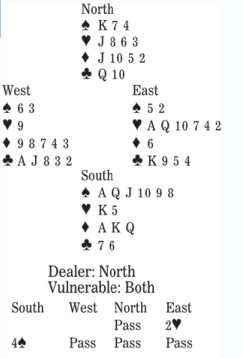 |
|
[Photo provided to China Daily] |
Margot Asquith, whose husband was the British prime minister from 1908 to 1916, wrote, "He's very clever, but sometimes his brains go to his head."
That's clever! At the bridge table, you gain most of your good results because the opponents make mistakes, rather than you do something clever. However, occasionally deals come along in which more than one player can be canny.
In this deal, South is in four spades after East opened with a weak two-bid in hearts. How should the play and defense proceed?
South assumed his partner had six or seven points and bid what he hoped he could make. He also thought a slam was unlikely since partner passed as dealer. South knows that West has led a singleton-but East does not. So, under the heart ace, South smoothly drops his king. Now East understandably shifts to his singleton diamond. However, South takes the trick, draws trumps in two rounds, cashes his other diamond winners, crosses to the spade king and discards a club loser on the diamond jack to make his contract.
If South does not play the heart king at trick one, or pauses noticeably, East will give his partner a heart ruff-and the card that East leads sends a suit-preference signal to West. However, East does not know whether to ask West to shift to clubs or diamonds. So East should return the confusing heart seven, his middle card. Then West should cash the club ace at trick three and, when East signals with the nine, play a second club to defeat the contract.


























 Raymond Zhou:
Raymond Zhou: Pauline D Loh:
Pauline D Loh: Hot Pot
Hot Pot Eco China
Eco China China Dream
China Dream China Face
China Face






